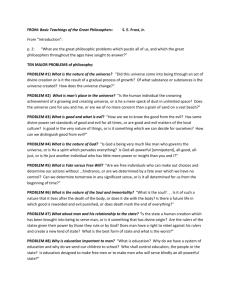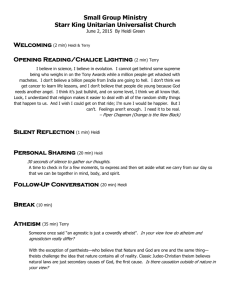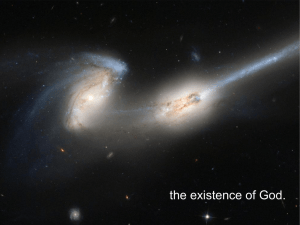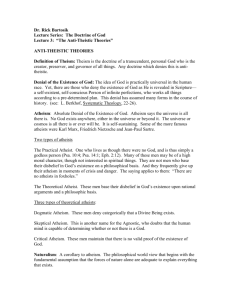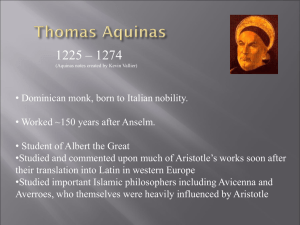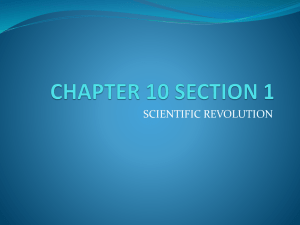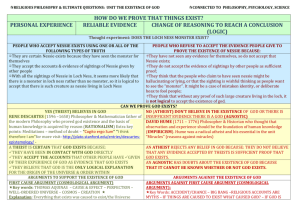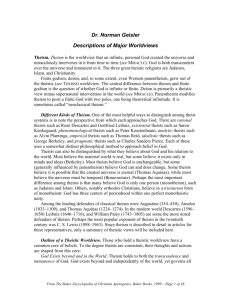God-Theism & Main Opposing World Views
advertisement
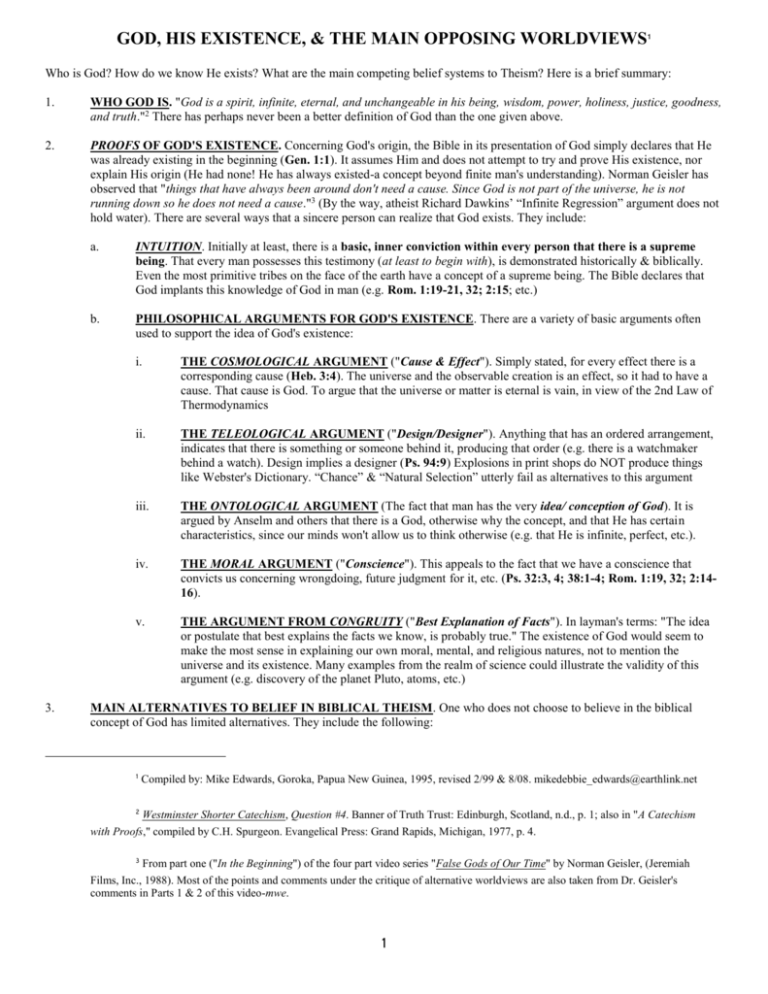
GOD, HIS EXISTENCE, & THE MAIN OPPOSING WORLDVIEWS1 Who is God? How do we know He exists? What are the main competing belief systems to Theism? Here is a brief summary: 1. WHO GOD IS. "God is a spirit, infinite, eternal, and unchangeable in his being, wisdom, power, holiness, justice, goodness, and truth."2 There has perhaps never been a better definition of God than the one given above. 2. PROOFS OF GOD'S EXISTENCE. Concerning God's origin, the Bible in its presentation of God simply declares that He was already existing in the beginning (Gen. 1:1). It assumes Him and does not attempt to try and prove His existence, nor explain His origin (He had none! He has always existed-a concept beyond finite man's understanding). Norman Geisler has observed that "things that have always been around don't need a cause. Since God is not part of the universe, he is not running down so he does not need a cause."3 (By the way, atheist Richard Dawkins’ “Infinite Regression” argument does not hold water). There are several ways that a sincere person can realize that God exists. They include: 3. a. INTUITION. Initially at least, there is a basic, inner conviction within every person that there is a supreme being. That every man possesses this testimony (at least to begin with), is demonstrated historically & biblically. Even the most primitive tribes on the face of the earth have a concept of a supreme being. The Bible declares that God implants this knowledge of God in man (e.g. Rom. 1:19-21, 32; 2:15; etc.) b. PHILOSOPHICAL ARGUMENTS FOR GOD'S EXISTENCE. There are a variety of basic arguments often used to support the idea of God's existence: i. THE COSMOLOGICAL ARGUMENT ("Cause & Effect"). Simply stated, for every effect there is a corresponding cause (Heb. 3:4). The universe and the observable creation is an effect, so it had to have a cause. That cause is God. To argue that the universe or matter is eternal is vain, in view of the 2nd Law of Thermodynamics ii. THE TELEOLOGICAL ARGUMENT ("Design/Designer"). Anything that has an ordered arrangement, indicates that there is something or someone behind it, producing that order (e.g. there is a watchmaker behind a watch). Design implies a designer (Ps. 94:9) Explosions in print shops do NOT produce things like Webster's Dictionary. “Chance” & “Natural Selection” utterly fail as alternatives to this argument iii. THE ONTOLOGICAL ARGUMENT (The fact that man has the very idea/ conception of God). It is argued by Anselm and others that there is a God, otherwise why the concept, and that He has certain characteristics, since our minds won't allow us to think otherwise (e.g. that He is infinite, perfect, etc.). iv. THE MORAL ARGUMENT ("Conscience"). This appeals to the fact that we have a conscience that convicts us concerning wrongdoing, future judgment for it, etc. (Ps. 32:3, 4; 38:1-4; Rom. 1:19, 32; 2:1416). v. THE ARGUMENT FROM CONGRUITY ("Best Explanation of Facts"). In layman's terms: "The idea or postulate that best explains the facts we know, is probably true." The existence of God would seem to make the most sense in explaining our own moral, mental, and religious natures, not to mention the universe and its existence. Many examples from the realm of science could illustrate the validity of this argument (e.g. discovery of the planet Pluto, atoms, etc.) MAIN ALTERNATIVES TO BELIEF IN BIBLICAL THEISM. One who does not choose to believe in the biblical concept of God has limited alternatives. They include the following: 1 Compiled by: Mike Edwards, Goroka, Papua New Guinea, 1995, revised 2/99 & 8/08. mikedebbie_edwards@earthlink.net 2 Westminster Shorter Catechism, Question #4. Banner of Truth Trust: Edinburgh, Scotland, n.d., p. 1; also in "A Catechism with Proofs," compiled by C.H. Spurgeon. Evangelical Press: Grand Rapids, Michigan, 1977, p. 4. 3 From part one ("In the Beginning") of the four part video series "False Gods of Our Time" by Norman Geisler, (Jeremiah Films, Inc., 1988). Most of the points and comments under the critique of alternative worldviews are also taken from Dr. Geisler's comments in Parts 1 & 2 of this video-mwe. 1 a. ATHEISM. Definition: The belief that God doesn't exist. Please note that Atheism is not just the absence of belief in God, but often substitute’s belief in the universe, “nature,” or man himself! Some problems: i. Atheists often ask why, if there is a God, is there all the evil and injustice in the world. But we should ask, "How can an atheist know what is just?" After all, if there is no God, then there are no absolutes, no way of determining what is just! But when atheists themselves decry the evil & injustice in this world, they show that there IS an absolute standard of justice & that they have a standard of justice. But how, when they believe there is no God and that there are no absolutes, no right or wrong, that we are just chance evolutionary products, can they turn around and make moral judgments or call something unjust? In truth, God & His Word is the absolute standard of justice. (Geisler) ii. Atheists believe that nothing caused the universe. Theists believe something caused the universe. Which view is more "rational?" Theism, obviously! iii. Atheists accuse theists of being irrational, and declare that the universe had no beginning. Actually though, atheists are the ones who are irrational (see “i” above), since scientific facts clearly indicate that the universe did indeed have a beginning: (1) The universe is winding down (cf. 2nd Law of Thermodynamics). So the universe must have been "wound up" at some earlier time. (cf. Ps. 102:25-27; Isa. 51:6; Heb. 1:10-11; etc) (2) The universe appears (?) to be expanding. If that is true, then it had to have started out smaller, earlier in its history, and thus had a beginning and a creator. b. AGNOSTICISM. Definition: The belief that God may or may not exist, but that man doesn't have enough information/ability to determine whether He does or doesn't. Romans 1:16-19 says that is bogus. c. DEISM. Definition: The belief that God exists and initially created-but is now totally detached from any personal involvement in it, i.e."He built the clock & wound it up, but it's now running on its own (out of control?) & the "watchmaker" (i.e. God) has no involvement with it." d. DUALISM. Definition: The idea that two beings (God & Satan; or two similar beings, one good and one evil) are involved in the universe & its affairs. e. PANTHEISM. Definition: The belief that everything is God and God is (in) everything. The "New Age Movement" is a modern example of this philosophy. Some problems: i. They have lots of different ideas about God. But if those ideas about God contradict each other—and they do—then they can't all be true. f. ii. Pantheists believe that everything that is good is God & (conversely) so is everything that is evil. But how can God be both good & evil? They try to get around this problem by saying that evil, sickness, etc., is just an illusion. "But if you drive your car into a wall you end up with more than a smashed illusion!" (Geisler) iii. If everyone is God, and each person is learning and changing, then God has changed. But God is changeless (Mal. 3:6). iv. How do pantheists know anything anyway, since they loudly declare that one must not trust reason! v. Pantheism also tends to cause its followers to withdraw & become self-centered, etc. Pantheism teaches self deification & is self oriented, whereas Theism teaches self-denial & is "others" oriented. Notice which faith has built the vast majority of hospitals, orphanages, rescue missions, etc., i.e. Christianity! POLYTHEISM. Definition: The belief in many gods, rather than one supreme God. This belief is seen in everything from Mormonism & their belief that God the Father & Jesus are different gods & that worthy Mormon males can become gods, to games like "Dungeons & Dragons," Harry Potter, and various children's cartoons on television. Some problems: i. Polytheism's gods are limited. But who needs, or can be helped by a limited god? ii. There are lots of gods & lots of confusion. There is diversity, but no unity. No one is in charge, so who knows if good will win or not? iii. Theism is based on rational truth claims and real empirical evidence. Polytheism has no such evidence. 2


